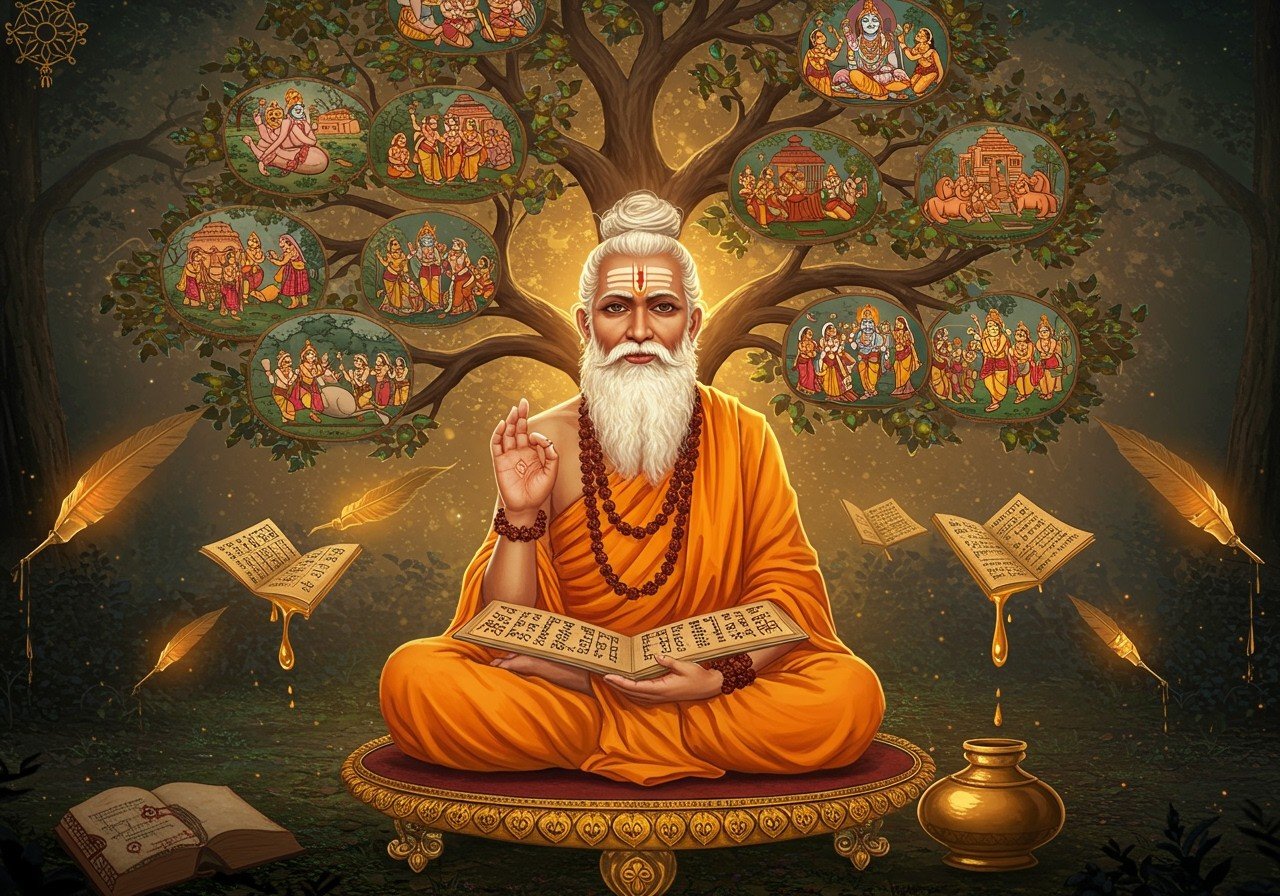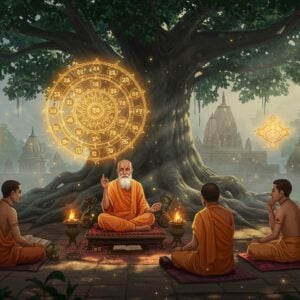
The Mahabharata, a cornerstone of ancient Indian literature, is a treasure trove of profound narratives and teachings. At the heart of this epic stands the venerable sage Vyasa, renowned as both its author and a significant character within its intricate plot. Exploring Vyasa’s multifaceted role offers a deeper understanding of his persona and his interactions with key figures like Ganesha and Sanjaya. This exploration caters to those who cherish tradition and seek wisdom within this timeless epic.
Vyasa’s Multifaceted Role in the Mahabharata
Vyasa occupies a unique position in the Mahabharata, embodying several crucial roles. Recognized as the author of this monumental work, he is also a pivotal character, participating in the very narrative he crafts. This duality adds a fascinating layer to the epic, blurring the lines between storyteller and participant.
Author and Storyteller
Vyasa, often referred to as Krishna Dwaipayana due to his dark complexion and birth on an island, transcends the role of a mere narrator. He meticulously chronicles events unfolding on earth and in other realms, capturing details of characters’ past lives and their intricate destinies. His storytelling emphasizes the sacred essence of the Mahabharata and its power to cleanse sin through study and recitation.
While Vyasa is credited with composing the Mahabharata, it’s his disciple, Vaiśampayana, who narrates the epic within the text itself. This layered narration creates a rich tapestry of voices and perspectives, adding depth to the narrative.
Explore our collection of Mahabharata scriptures and related texts at Poojn.in
Family Ties and Lineage
Vyasa’s influence permeates the intricate family dynamics of the Mahabharata. As the biological father of Dhritarashtra, Pandu, and Vidura, he is deeply connected to both sides of the Kurukshetra War. This familial link underscores the interconnectedness of the warring factions, adding a layer of complexity to the conflict.
Born to Satyavati and the sage Parashara, Vyasa’s birth is imbued with divine elements, foreshadowing his extraordinary destiny. Satyavati received a boon from Parashara that her son would be a Brahmarshi, equal to the revered Vashistha, and celebrated for his profound wisdom. Vyasa gained his vast knowledge from esteemed sources such as the four Kumaras, Narada, and Brahma.
Sage and Advisor
Vyasa serves as a wise counsel to both the Kauravas and Pandavas, offering guidance amidst their conflicts. However, his advice often goes unheeded by figures like Duryodhana and Dhritarashtra, leading to tragic consequences. Nevertheless, Vyasa remains a steadfast presence, guiding them through their tumultuous journeys.
His interventions at critical junctures, such as the infamous game of dice and the devastating war at Kurukshetra, demonstrate his profound understanding of dharma (righteous conduct) and karma (the law of cause and effect). Vyasa’s counsel to Arjuna and Yudhishthira reflects his deep grasp of duty and morality, offering invaluable lessons to both the characters and the readers of the epic.
Philosophical Influence
Vyasa’s contributions extend to the inclusion of the Bhagavad Gita within the Mahabharata. This profound philosophical text offers invaluable insights into dharma, detachment, and the nature of the self. It is within this dialogue that Krishna imparts his divine wisdom to Arjuna on the battlefield of Kurukshetra.
The culmination of the Mahabharata marks the end of the Dvapara Yuga and the beginning of the Kali Yuga. This transition symbolizes the cyclical nature of time and the enduring importance of dharma throughout these cycles. Vyasa’s teachings highlight the impermanence of life and the importance of adhering to one’s righteous duty.
Explore our collection of Bhagavad Gita editions available at Poojn.in
Vyasa and Ganesha: A Divine Collaboration
The collaboration between Vyasa and Ganesha in the creation of the Mahabharata holds a special place in Indian tradition. Vyasa, seeking a scribe for his monumental epic, chose Lord Ganesha, who agreed to write provided that Vyasa dictated the verses without pause. This divine partnership showcases Vyasa’s connection to the divine realm and the sacred nature of the Mahabharata.
This unique partnership is further enriched by the tale of Vyasa testing Ganesha’s intellect by incorporating complex verses, ensuring that Ganesha comprehended the meaning before transcribing. This underscores the depth and complexity of the epic, highlighting the harmony between human effort and divine assistance in its creation.
Vyasa and Sanjaya: Witnessing the Kurukshetra War
Vyasa’s relationship with Sanjaya, the charioteer of King Dhritarashtra, is a crucial element in the narrative of the Mahabharata. Vyasa bestowed upon Sanjaya the divine gift of vision, enabling him to narrate the events of the Kurukshetra War to the blind king. This act exemplifies Vyasa’s ability to bridge the mortal and divine worlds.
This divine gift also underscores Vyasa’s foresight, ensuring that the lessons of the epic reach future generations. The dialogues between Vyasa and Sanjaya emphasize the importance of duty, truth, and the pursuit of knowledge, adding another layer of philosophical depth to the epic.
Explore resources for spiritual growth and understanding ancient wisdom at Poojn.in
Conclusion: Vyasa’s Enduring Legacy
Vyasa’s presence in the Mahabharata remains profound and enduring. As author, storyteller, and character, he weaves a narrative that explores the complexities of dharma and the human condition. His familial ties and his role as a sage advisor shape the epic’s trajectory, emphasizing the importance of wisdom and tradition. Through his philosophical contributions, including the Bhagavad Gita, Vyasa’s legacy continues to inspire and guide those seeking understanding in this timeless epic.
FAQs on Vyasa’s Mahabharata Portrayal: The Sage’s Character and Influence
What role does Vyasa play in the Mahabharata? Vyasa is recognized as the author and a central character in the Mahabharata, serving as a sage and advisor.
How did Vyasa influence the Mahabharata’s narrative? Vyasa’s masterful storytelling and inclusion of philosophical themes like dharma and karma shaped the narrative, making it a timeless tale of morality and duty.
What is the relationship between Vyasa and Ganesha in the Mahabharata? Vyasa dictated the Mahabharata to Ganesha, who served as his scribe, a collaboration that emphasizes the epic’s sacred nature and complexity.
How does Vyasa’s character impact the readers of the Mahabharata? Vyasa’s wisdom and impartiality encourage introspection on dharma and justice, offering readers profound insights into the epic’s deeper meanings.
What is the significance of Vyasa and Sanjaya’s relationship in the Mahabharata? Vyasa granted Sanjaya divine vision to narrate the Kurukshetra War, highlighting Vyasa’s foresight and his role as a link between the mortal and divine realms.
Why is Vyasa’s portrayal important in Indian tradition? Vyasa is revered as a compiler of ancient wisdom. His portrayal strengthens the value of guidance and cultural preservation in Indian tradition.
How does Vyasa’s storytelling style affect the Mahabharata? Vyasa’s detailed and emotive style creates a deep connection between the readers and the characters, transforming the Mahabharata into a timeless lesson on life, morality, and the complexities of human existence.


